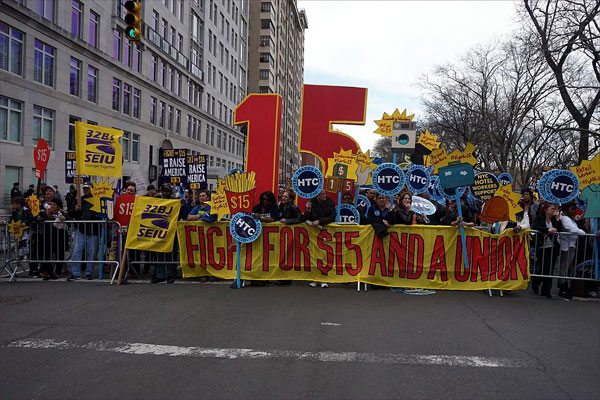
January 9, 2018; New York Times
Workers’ rights organizations that advocate for higher wages across industries and localities are, in many cases, stymied in their attempts to unionize or negotiate contracts workplace by workplace. So, they are looking to other mechanisms to benefit their members, increasingly acting outside the collective bargaining process. The Fight for $15 campaign is one example of this broader, industry-based approach. A challenge, however, is that these organizations therefore do not conform to the traditional definition of unions, and consequently lack a stable source of membership dues. But that may be changing, starting with New York City’s fast food workers.
A hybrid of union dues collection and workplace solicitation programs, crossed with a bit of rage fundraising, has cropped up in New York, where a groundbreaking law passed last year by the City Council allows workers to request that money be taken out of their paychecks and donated to nonprofits that advocate for them. The donations are only authorized once the nonprofit in question signs up 500 participants.
So far, 1,200 fast food workers have signed up to donate $13.50 a month (which is one hour’s pay at minimum wage) to Fast Food Justice, the first nonprofit to sign up for the program. Long an effective grassroots organizing group, Fast Food Justice became a nonprofit only five months ago.
Sign up for our free newsletters
Subscribe to NPQ's newsletters to have our top stories delivered directly to your inbox.
By signing up, you agree to our privacy policy and terms of use, and to receive messages from NPQ and our partners.
Tsedeye Gebreselassie, chairwoman of Fast Food Justice’s board and a senior staff attorney at the National Employment Law Project, says, “What’s important about this law is it provides for a way for fast-food workers to help sustain a nonprofit organization that’s dedicated to advocating for issues that members say is important to them.”
And the organization has indeed demonstrated its importance. A group of restaurant owners represented by the Restaurant Law Center has filed a federal lawsuit to challenge the law as a violation of their First Amendment rights. “We think this law is a way of trying to get restaurants to fund groups” that “will harass restaurants with money from the restaurants,” said Angelo Amador, the law center’s executive director, apparently forgetting that it is the workers’ money being donated. “It doesn’t make any sense.”
Clearly, this is a provision that may be replicated elsewhere across the country where local government supports an increase in minimum wage.—Ruth McCambridge













